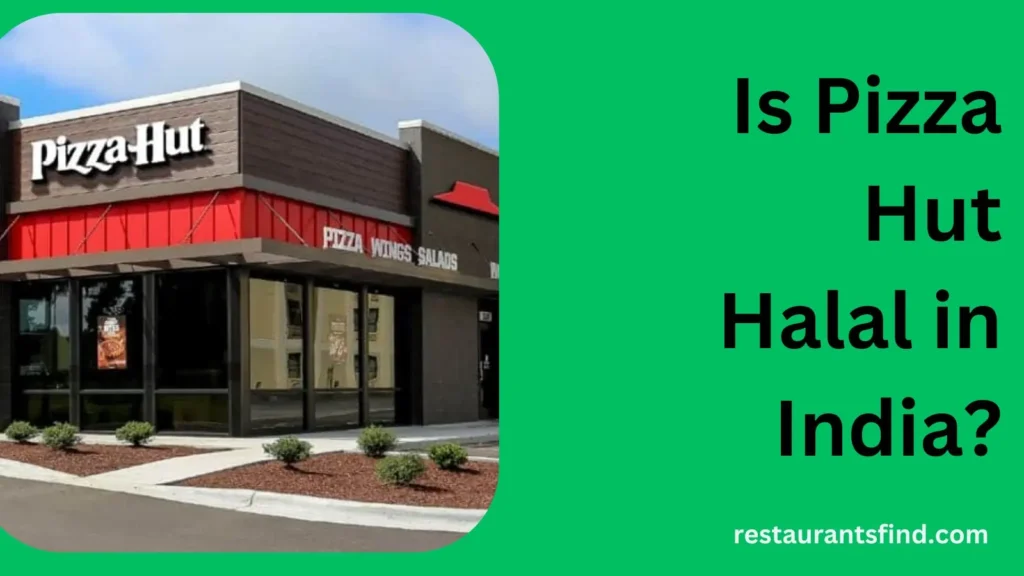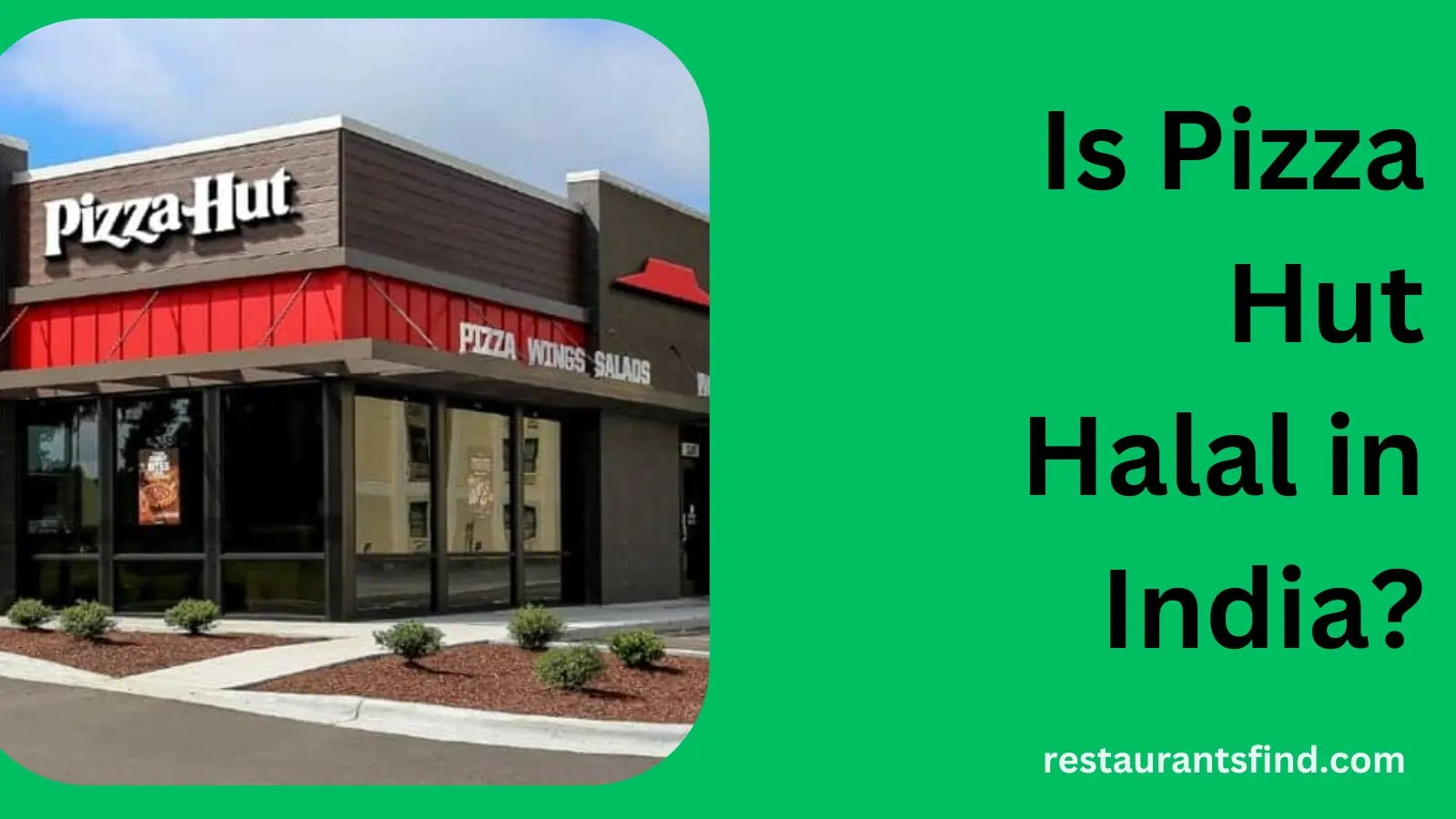Pizza Hut, found in over 100 countries with 18,000 outlets worldwide, has been serving pizza in India since 1996, boasting more than 500 restaurants across the nation.
The question on the minds of many Muslim consumers is whether Pizza Hut in India adheres to halal standards.
Halal, an Arabic term meaning “permissible” in Islam, outlines dietary laws that Muslims follow, including avoiding certain foods like pork, alcohol, blood, and animals not slaughtered according to Islamic rules. Halal certification ensures that food aligns with these standards for Muslim consumption.

This blog aims to address the concern of Muslim consumers by providing a clear answer to the question: Is Pizza Hut Halal in India?
Is Pizza Hut Halal in India?
The clear answer to the question is No, Pizza Hut in India is not halal. According to the official website, their food is prepared following strict food and safety procedures, but it does not meet Halal standards. Pizza Hut does not have halal certification at any of its stores in India.
Therefore, if you are a Muslim and adhere to halal dietary restrictions, Pizza Hut may not be a suitable choice for you. However, if you still choose to dine there, there are vegetarian options available.
Customer Transparency
Pizza Hut India shares information for customers concerned about the halal status of their products. On their website’s “Frequently Asked Questions” section, they address common queries such as:
- Do you use pork or beef in your products?
- Do you use animal fat or gelatin in your products?
- Do you use alcohol or wine in your products?
- Do you use rennet or cheese from animal sources in your products?
While the answers depend on the product and region, Pizza Hut India generally claims not to use pork, beef, animal fat, gelatin, alcohol, or wine.
However, they do acknowledge using rennet and cheese from animal sources, which may not align with halal standards for some Muslims.
Pizza Hut India emphasizes respecting the religious sentiments of customers and maintaining high hygiene and quality standards.
They state using separate utensils for vegetarian and non-vegetarian products and labeling according to Food Safety and Standards Authority of India (FSSAI) guidelines.
Yet, these efforts may not sufficiently convey the halal status to the public. Some Muslim consumers might not be aware that Pizza Hut India lacks halal certification or might question the provided information.
Additionally, FSSAI guidelines for labeling may not fully align with halal criteria, neglecting aspects like source, slaughter, and handling of animal products.
Read: Is Doritos Halal in India?
Challenges and Concerns
Lack of Uniform Authority
India lacks a central halal certification body, leading to multiple private organizations like Halal India, Jamiat Ulama-i-Hind Halal Trust, Halal Committee, and Halal Certification Services India providing varying standards, procedures, and fees. This lack of uniformity causes confusion among consumers and producers.
Social and Political Sensitivity
India, being a secular and diverse nation, has a complex social and political landscape with a history of communal violence. The halal issue is sensitive and can evoke negative reactions, especially due to religious and cultural diversity.
For example, in 2017, a controversy erupted when a Hindu group protested against the halal certification of Patanjali products, a popular brand of ayurvedic and natural products founded by a Hindu yoga guru.
The group claimed that the halal certification was a way of appeasing the Muslim community and promoting Islamic ideology.
Similarly, McDonald’s faced an issue when they said they only serve halal meat. Some Hindus felt this was unfair to non-Muslims and started a social media boycott.
This led to legal troubles and criticism from both Muslim and non-Muslim customers, the government, and the media. Some people suggested McDonald’s should serve both halal and non-halal options or just stick to a neutral food policy without bringing in religious labels.
If Pizza Hut India decides to pursue halal certification, they might face questions:
- Selecting Credible Certification:- Choosing a credible halal certification organization that meets international standards and local expectations is a critical decision.
- Transparent and Ethical Certification Process:- Ensuring transparency, ethics, and cost-effectiveness in the halal certification process is essential for gaining trust.
- Communication Strategy:- Effectively communicating the benefits and value of halal certification to customers and stakeholders is vital for acceptance.
- Handling Backlash and Criticism:- Managing potential backlash and criticism from those opposing or misunderstanding the halal concept requires a thoughtful approach to address concerns and misconceptions.
Alternatives for Halal Food
For Muslim consumers seeking halal options in India, there are alternatives to Pizza Hut worth considering. Some of these alternatives include:
1. Other halal-certified options in India
Various international and local food chains like KFC, McDonald’s, Subway, Domino’s, Al-Baik, Saffron, and Haldiram’s offer halal-certified products in India.
However, it’s crucial to note that the halal certification may vary by location. Therefore, it’s advisable to double-check with the manager before choosing these options.
2. Local and authentic halal options
In regions and cities with a significant Muslim population, such as Hyderabad, Lucknow, Delhi, Mumbai, and Kerala, there are numerous local and authentic halal options.
These alternatives provide a diverse range of quality cuisine, including biryani, kebabs, curries, rotis, and sweets, offering Muslim consumers a rich and flavorful experience aligned with their dietary preferences.
Halal Options at Pizza Hut
For Muslim consumers in India who still wish to dine at Pizza Hut, some pizza choices may be suitable, depending on their level of strictness and preference.
Some of the vegetarian pizza options include:
- Veggie Lover
- Paneer Makhani
- Veg Exotica
- Cheese Maxx
Pizza Hut India provides a variety of vegetarian pizzas that do not contain meat or animal products, except for cheese. However, the halal status of the cheese depends on its source and the rennet used.
Therefore, Muslim consumers who are not very strict about cheese may consider these pizzas. It’s advisable for them to inquire about the ingredients and preparation methods before placing an order.
Conclusion
Pizza Hut is not halal in India as stated on their official website. Muslim consumers seeking halal food should either avoid Pizza Hut in India or carefully choose specific pizza options.
While Pizza Hut India provides some information about their products’ halal status, it may not fully assure Muslim consumers.
Pursuing halal certification in India could pose challenges for Pizza Hut, including the lack of a uniform authority, social and political sensitivity, and potential criticism.
Muslim consumers in India seeking halal options may explore alternatives like other certified options or local and authentic choices offering variety and quality aligned with their faith.

